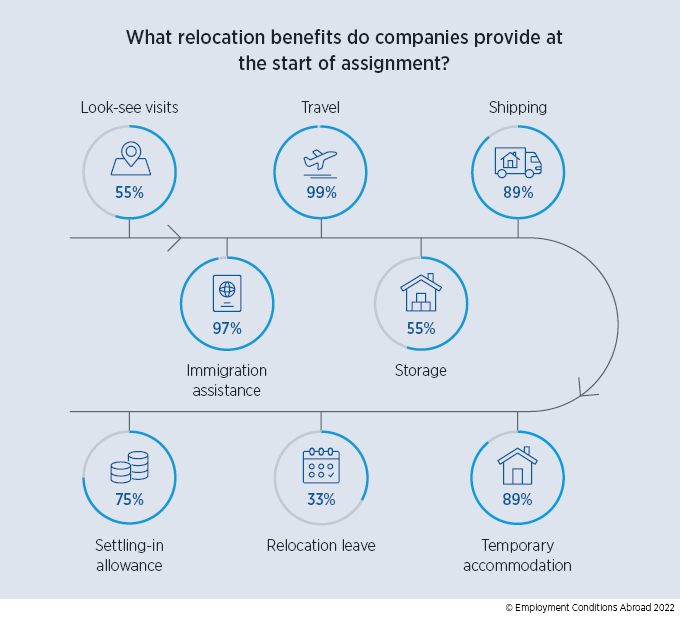When it comes to relocating staff internationally, organisations recognise the importance of comprehensive support in ensuring that assignments start and end well. Despite widespread cost pressures made worse by the Covid-19 pandemic, our International Relocation Benefits Survey showed that the actual benefits provided to relocating staff have remained consistent over the years. As well as travel to and from the host location and help with immigration, which are provided by almost all organisations, most also provide orientation and briefing services, shipping of personal goods and temporary accommodation.

However, the way in which these benefits are provided is changing, with organisations increasingly looking to provide more flexibility in their approaches. 42% now use a flexible approach, and this looks set to increase in future as a further 18% plan to do this.
0%
Now use a flexible approach in providing benefits.
0%
Plan to use a flexible approach in the future.
The most common flexible approach is to provide a fixed lump sum for assignees to allocate as they require, with 69% of those employing such an approach using this method. This method provides the most flexibility, and its ease of management is also a factor in its popularity. The other main flexible approaches are a managed lump sum (where the company specifically defines the benefits covered by the lump sum) and core-flex (where the company defines certain standard benefits with a flexible selection of additional benefits), although each are only used by a minority.
Ensuring flexibility is naturally the main aim, but there are many factors to consider when dealing with fixed lump sums. For example, should the allowance be the same for all assignees or should it vary – and if it varies, then how? Only 25% of organisations provide the same flat rate to all assignees, with 40% varying the amount according to family size and/or seniority and 24% simply calculating the lump sum as a percentage of the employee’s salary.
Although the fixed lump sum is for the assignee to spend on relocation benefits according to their own requirements, organisations still need to decide which benefits to consider when calculating the actual amount. There is significant variation in exactly which benefits form the basis of the lump sum, but over half of organisations consider settling-in and clothing allowances and shipping costs. Only 44% of organisations providing a fixed lump sum for relocation benefits consider travel to and from the assignment country when calculating the allowance, despite provision of that benefit being near universal. This suggests that relocation travel is such an important benefit that it is considered separately in the case of lump sums.
Provision of flexible relocation benefits options can have benefits beyond the ease of management. The additional flexibility allows for benefits to be tailored to individual needs, improving the assignee experience. Flexible approaches can also result in cost savings. For example, with shipping costs having increased significantly, providing options around whether to ship household goods or put them in storage and source suitable items in the host country could well be more cost-effective than simply paying for a shipping container. Depending on how host country furniture is sourced, this could also have sustainability benefits by reducing the organisation’s shipping-related emissions. Around one in three of the organisations who participated in our latest Global Mobility Now Survey plan to introduce a flexible benefits policy in order to encourage assignees to make more sustainable choices, or have already done so.
Providing benefits ‘in kind’, where the employer pays directly, often offers tax efficiency advantages, gives the employer more control, and ensures a duty of care to staff as well as easing administrative burdens on assignees. Sometimes they are even used to stipulate a more sustainable approach to relocation where possible – for example, providing furniture storage as a benefit in kind reduces shipping. However, assignees and their families are at the centre of the relocation process, so giving them more say when it comes to relocation-specific benefits is a natural step. More and more companies are now trying to find the balance that works for them and their assignees.
FIND OUT MORE
The International Relocation Benefits Survey is available to purchase, or can be accessed free of charge within MyECA for those who participated in the survey. An earlier blog post shared key findings from the survey, which you can find here.
We also recently produced a survey focusing on trends and best practice in the provision of benefits and allowances for international assignments of between one and five years. You can view key survey highlights from the Benefits for International Assignments Survey, published in July 2021, in this blog post.
Please contact us to speak to a member of our team directly.